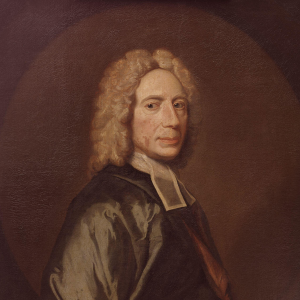


Isaac Watts (1674-1748)
Repertoire:
I Sing the Mighty Power of God
Come Ye that Love the Lord
Jesus Shall Reign Where'ere the Sun
O God our Help in Ages Past
When I Survey the Wondrous Cross
Alas! And Did My Savior Bleed
When I Can Read My Title Clear
It is difficult to determine how a young life will be lived. Who knew that the child who once wrote during family prayers: “There was a mouse for want of stairs, ran up a rope to say his prayers,” would write many years later “See from His head, His hands His feet, Sorrow and love flowed mingled down. Did e’er such love and sorrow meet, Or thorns compose so rich a crown.”
In his later years, Isaac Watts once complained about hymn singing in church “To see the dull indifference, the negligent and thoughtless air that sits upon the faces of a whole assembly, while the psalm is upon their lips, might even tempt a charitable observer to suspect the fervency of their inward religion.”
He had bemoaned such since his late teens. His father, tired of his complaints, challenged him to write something better. The following week, Isaac presented his first hymn to the church, “Behold the Glories of the Lamb,” based on Revelation 5:6-12. He was only 15 years old but the career of the “Father of English Hymnody” had begun. As Scottish Hymnist John Brownlie, D. D., later wrote, “The grey dawn is about to flee before the sunrise. With Isaac Watts the first golden streaks of morn are seen: when a greater than he, Charles Wesley, strikes the harp, day will have been ushered in.”
Isaac Watts was born into a Dissenting Nonconformist family in Southampton, July 17, 1674. He was the eldest of nine children. Watts was in frail health all of his life, and at only five feet tall, he was not a physically imposing figure. His father was imprisoned at least twice during Isaac’s infancy for his religious convictions and his public position against the Church of England. Isaac always remembered and respected his father’s courage.
His abilities became obvious in early childhood. He was taught Latin at age 4, Greek at age 9, French when he was 12, and Hebrew by the time he was 13. His obvious abilities led to the offer of education at one of the universities for eventual ordination into the Church of England. He refused this path and instead entered the Dissenting Nonconformist Academy at Stoke Newington in 1690. He completed his studies in 1694 and he became a tutor to the family of Sir John Hartopp of Stoke Newington. That family had long been involved with the Dissenting Nonconformist movement and this placed Watts at the center of religious dissent in the area. He began preaching occasionally at the Hartopp family chapel and in 1699, he was appointed assistant to the minister of Mark Lane Independent Chapel. Mark Lane was then one of the city’s most influential Independent churches. In March 1702 he became pastor.
Besides writing hymns, Isaac Watts was a theologian and logician, writing books and essays on these subjects. One of his textbooks on logic was particularly popular. The full title, Logick, or The Right Use of Reason in the Enquiry After Truth With a Variety of Rules to Guard Against Error in the Affairs of Religion and Human Life, as well as in the Sciences was first published in 1724 and went through twenty editions. It became the standard text on logic at Oxford, Cambridge, Harvard, and Yale. He also wrote educational books on geography, astronomy, grammar, and philosophy. Yet with all his many accomplishments as an author and a pastor, it is Dr. Watts’s amazing facility with poetry that has left a lasting imprint on history.
After suffering a physical breakdown in his health in 1712, he accepted an invitation to visit Sir Thomas Abney at his residence in Abney Park. The original invitation was for a few weeks, but this visit extended and for the next 36 years, Abney, then his wife and daughter, kept Watts as guest and friend at their home. He continued to write and preach as often as his health would permit.
Watts eventually wrote more than 750 hymns including, Alas! And Did My Savior Bleed; When I Survey the Wondrous Cross; Am I a Soldier of the Cross; At the Cross; Joy to the World! The Lord is Come; O God Our Help in Ages Past; We’re Marching to Zion; When I Can Read My Title Clear; Come We That Love The Lord; and I Sing the Mighty Power of God. His model for the congregational song, the hymn, remains in current use throughout the English-speaking world.
I Sing the Mighty Power of God (Praise for Creation and Providence) appeared in his book Divine Songs attempted in Easy Language, for the Use of Children (1718). Divine Songs is recorded as the first English hymnal written especially for children. The song was written to be used to teach Biblical principles about creation to a child. In this “children’s song” we see many major truths presented about God. We see His: Creative power (v1), Wisdom (v2), Sovereign authority (v2, 5, 7), Goodness (v3), Wonders (v4), Glory (v5), Omnipresence (v6, 8), Love (v7), Wrath (v8), and Protection (v8). It is amazing to realize the level of understanding Dr. Watts expected in the young. In the book’s Preface he writes, “[These songs] will be a constant furniture of the minds of children, that they may have something to think upon when alone, and sing over to themselves. This may sometimes give their thoughts a divine turn, and raise a young meditation. Thus they will not be forced to seek relief for an emptiness of mind, out of the loose and dangerous sonnets of the age.”
Watts wrote hymns that departed from the psalms and included more personal expressions. This did not please everyone. Some felt his hymns were “too worldly” for the church as they were not based on the Psalms. Yet Watts felt strongly that the Christian church congregation and not just the choir should sing of Christ. He explained it this way: “Where the Psalmist describes religion by the fear of God, I have often joined faith and love to it. Where he speaks of the pardon of sin through the mercies of God, I rather choose to mention the sacrifice of Christ, the Lamb of God. Where He promises abundance of wealth, honor, and long life, I have changed some of these typical blessings for grace, glory, and life eternal, which are brought to light by the gospel, and promised in the New Testament.” He noted in his Hymns and Spiritual Songs: “While we sing the praises of God in His church, we are employed in that part of worship which of all others is the nearest akin to heaven, and ’tis pity that this of all others should be performed the worst upon earth. That very action which should elevate us to the most delightful and divine sensations doth not only flat our devotion but too often awakens our regret and touches all the springs of uneasiness within us.”
Of course, that is still today our command as Christians, especially Christian parents. “And these words, which I command thee this day, shall be in thine heart: And thou shalt teach them diligently unto thy children, and shalt talk of them when thou sittest in thine house, and when thou walkest by the way, when thou liest down, and when thou risest up.” (Deut. 6:6-7)
To the extent they accurately reflect what the Bible has to say, the great hymns of the church are a useful tool in this. Whether in the family circle, or the house of God, we are admonished: “Let the word of Christ dwell in you richly in all wisdom, teaching and admonishing one another in psalms and hymns and spiritual songs, singing with grace in your hearts to the Lord.” (Col. 3:16)
It is worthwhile to pause a moment and remember Watts’s words recorded on his deathbed. They reveal the faith and dedication of this great servant of God: “If God should raise me up again, I may finish some more of my papers, or God can make use of me to save a soul, and that will be worth living for. If God has no more service for me to do, through grace I am ready; it is a great mercy to me that I have no manner of fear or dread of death….I trust all my sins are pardoned through the blood of Christ….I have no fear of dying.”
Watts died quietly in the afternoon of November 25, 1748, at the Abney’s home in Stoke. He was buried at Bunhill Fields in London, the Dissenter’s Graveyard.
SOURCES:
A Dictionary of Hymnology; John Julian, Dover Publications; 1907
Annotations of the Hymnal; Charles Hutchins, M.A.; 1872.
The Gospel In Hymns; Albert Edward Bailey, Charles Scribner’s Sons; 1950
The Hymns and Hymn Writers of the Church Hymnary; John Brownlie, D.D.; Henry Frowde; 1911
